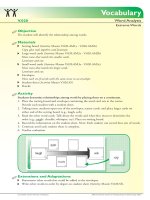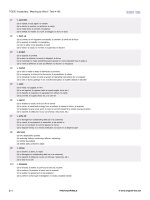UEfAP word formation2
Bạn đang xem bản rút gọn của tài liệu. Xem và tải ngay bản đầy đủ của tài liệu tại đây (93.44 KB, 1 trang )
25/2/2016
UEfAP Word Formation
UEfAP Word Formation
The branch of grammar that studies word formation is morphology. It contrasts with syntax, the study
of word combinations and consists of two fields: the study of inflection and the study of word formation.
A knowledge of word formation is important in EAP. Formal written English uses nouns more than
verbs. For example, "judgement" rather than "judge", "development" rather than "develop",
"admiration" rather than "admire". So it important top be able to change verbs to nouns etc. This is
called nominalisation.
For example:
There appeared to be evidence of differential treatment of children. (the verb "treat" becomes
"treatment")
This is reflected in our admiration for people who have made something of their lives, sometimes
against great odds, and in our somewhat disappointedjudgment of those who merely drift through life.
(The verb "admire" becomes "admiration".)
All airfields in the country would be nationalised, and the government would continue with the
development of new aircraft as recommended by the Brabazon Committee. (The verb "develop"
changes to "development")
Associated with nominalisation is the occurrence of prepositional phrases, introduced by of:
judgment of those
treatment of children
development of new aircraft
"tion" is the most common suffix used in this way. For example: "alteration, resignation".
However others are: "ity ability, similarity, complexity; ness blindness, darkness, preparedness; ment
development, encouragement; ship friendship; age mileage; ery robbery, bribery; al arrival; ance
assistance, resemblance".
/>
1/1









